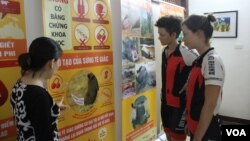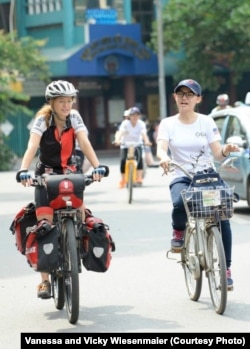Vanessa and Vicky Wiesenmaier say the poaching of rhinoceroses is gruesome: hunters tranquilize the animal and then cut off the horn. When the rhino wakes up it slowly bleeds to death.
The sisters were so appalled by the killings in their native South Africa that they embarked on a bicycle tour to raise awareness in Asia, where consumers buy horn products they believe cure everything from cancer to hangovers. At tens of thousands of dollars per kilogram, the horns are a luxury item sometimes gifted to bosses and officials.
“To know that these animals are killed for pure greed and money, for some funny belief that the horn is a status symbol, that’s a tragedy,” Vicky, 35, said.
While stopping at a guesthouse near the Laos-Vietnam border, she and her sister told VOA the issue was personal. The Wiesenmaiers spoke of a friend in South Africa who had four of the six rhinos on his reservation slaughtered. He decided to leave the carcasses out so that travelers could see the results of poaching.
“We saw live rhinos before that, so to see this crumbled, dead thing, it was really shocking, it was disgusting,” Vicky said by Skype.
The sisters said their love of wildlife came from all their time spent in the South African bush, such as visits to national parks.
“Basically, you set up your tent in these parks next to a watering hole and watch animals come and go, and it’s just the most amazing holiday,” Vanessa, 30, said. But that’s changed as poachers have devastated the indigenous species. “At the moment some of these parks are absolute war zones.”
World’s top horn consumer: Vietnam
The sisters are cycling 6,000 kilometers over the course of half a year, pausing in multiple cities to tell locals, “Buy no rhino,” which is the rhyming name of their campaign. They have stopped by several schools and will do so again in September when they return to Vietnam, which is the biggest consumer of rhino horns in the world. Vanessa and Vicky show students a presentation about the harms of the horn trade, hold a discussion and then have students create artwork on the topic.
Activists are reaching out to students in hopes they’ll be more open-minded and then pass on the message to their parents. Vietnamese businessmen, celebrities, and state officials are “the strongest driver of the current rhino poaching crisis,” according to a 2013 report by wildlife group TRAFFIC.
For their bike tour, the Wiesenmaiers joined Operation Game Change, a campaign to convince Vietnamese that powder made from rhino horns has no proven medicinal value.
“In general, people understand the problem” of poaching, said Hoang Vu Lan Phuong, project coordinator at the Freeland Foundation, which runs the campaign. “But when it comes to protecting their health and their family's health, they're going to still go out and do it. So that’s what we want to change, is their attitude.”
Poaching on the rise
Advocacy in Vietnam has focused on curbing demand for horn products. Besides the bike tour, groups have raised awareness through workshops, posters, and a film contest. They’re also working on the supply side, by urging governments globally to update their laws, seize contraband, and prosecute traffickers.
South Africa and Vietnam are the key countries involved in the supply and demand sides of the rhino trade, respectively. Data from Operation Game Change show that 1,215 rhinos were poached in South Africa in 2014, compared with 122 rhinos five years earlier.
On their tour, the Wiesenmaiers will cover China, Vietnam, Laos, Cambodia, Thailand, Malaysia, and Singapore.





